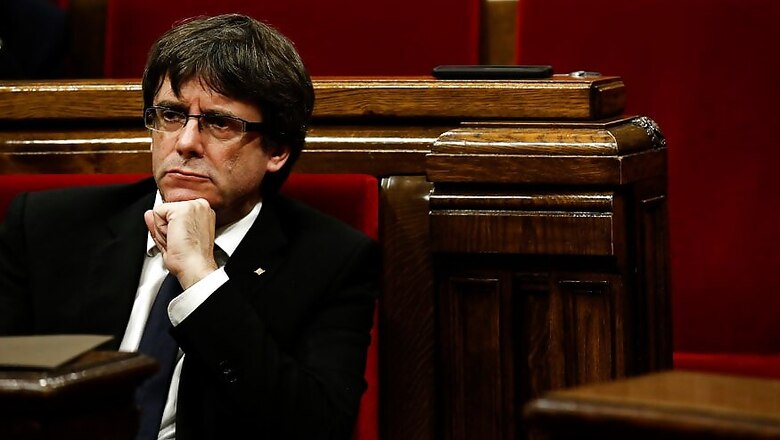
views
Barcelona: Madrid on Monday gave Catalonia's separatist leader three more days to "return to legality" after he refused to say whether he would follow through on a threat to declare independence from Spain.
Responding to an initial deadline set by the central government, Carles Puigdemont sent a letter early Monday calling for talks with Prime Minister Mariano Rajoy "as soon as possible" amid Spain's worst political crisis in decades.
But he stopped short of giving a definitive "yes or no" as demanded by Madrid after his ambiguous independence speech last week, and Spain gave him until Thursday morning to clarify.
Anything less than a full climb-down by Thursday's 10:00 am deadline is likely to prompt moves by Madrid to impose direct control over the semi-autonomous region.
"The government regrets that the president of the Catalan government has decided not to respond to the request made by the government," Deputy Prime Minister Soraya Saenz de Santamaria told a news conference.
"All we are asking for is clarity."
In Monday's letter addressed to the premier, Puigdemont wrote: "For the next two months, our main objective is to bring you to dialogue."
In a written response, Rajoy said it was "absolutely necessary" that Catalonia clarify its position.
"I hope that in the hours that remain until the second deadline... you reply with all the clarity which citizens demand and the law requires," Rajoy said, calling on the Catalan separatists to "return to legality".
European Union officials are keeping a close eye on developments amid fears that Catalan independence could put further strain on the bloc as it grapples with Britain's shock decision to leave.
'Growing repression'
Puigdemont had told regional lawmakers last week he was ready for Catalonia to "become an independent state" following a secession referendum on October 1 that went ahead despite a court ban.
But he immediately said he was suspending proceedings to allow time for negotiations with Madrid.
Puigdemont and some separatist allies want mediation with Madrid over the fate of the 7.5 million-strong region, an idea the central government says is a non-starter.
In his letter, he wrote that his "suspension of the political mandate given by the polls on October 1 demonstrates our firm will to find a solution and not confrontation.
"Our desire for dialogue is sincere, despite all that has happened," he added.
Rock and a hard place
Catalonia, an economic heavyweight that accounts for a fifth of Spain's economy, has its own language and distinct culture but is deeply divided over independence.
Separatists argue the prosperous region is helping to prop Spain up, saying it pays more in taxes than it gets back and that a break from the rest of the country would allow it to prosper.
But the region itself is profoundly split on independence. Although separatists say 90 percent of people who voted on October 1 backed secession from Spain, turnout was just 43 percent as many unity supporters stayed home.
The Spanish government says growing uncertainty over Catalonia, which is deeply indebted to Madrid and which cannot borrow internationally, imperils Spain's recovery from the financial crisis.
The two biggest Catalan banks have already moved their legal headquarters to other parts of Spain, while ratings agency Standard and Poor's has warned of a recession in the region if the crisis drags on.
Puigdemont, a 54-year-old former journalist and father of two, is under intense pressure from Madrid and world leaders to back off.
But he is also being squeezed by his separatist allies to crack on with independence.
Rajoy said he is ready to invoke article 155 of Spain's constitution, allowing him to retake full control of Catalonia -- the so-called "nuclear option."
And Puigdemont's separatist allies have threatened mass strikes and protests in the event of a climb-down.
Adding to tensions is the expected appearance in court in Madrid of Catalan police chief Josep Lluis Trapero.
He is to be questioned on accusations of sedition for his handling of pro-independence protests and for allegedly failing to stop the October 1 vote.

















Comments
0 comment